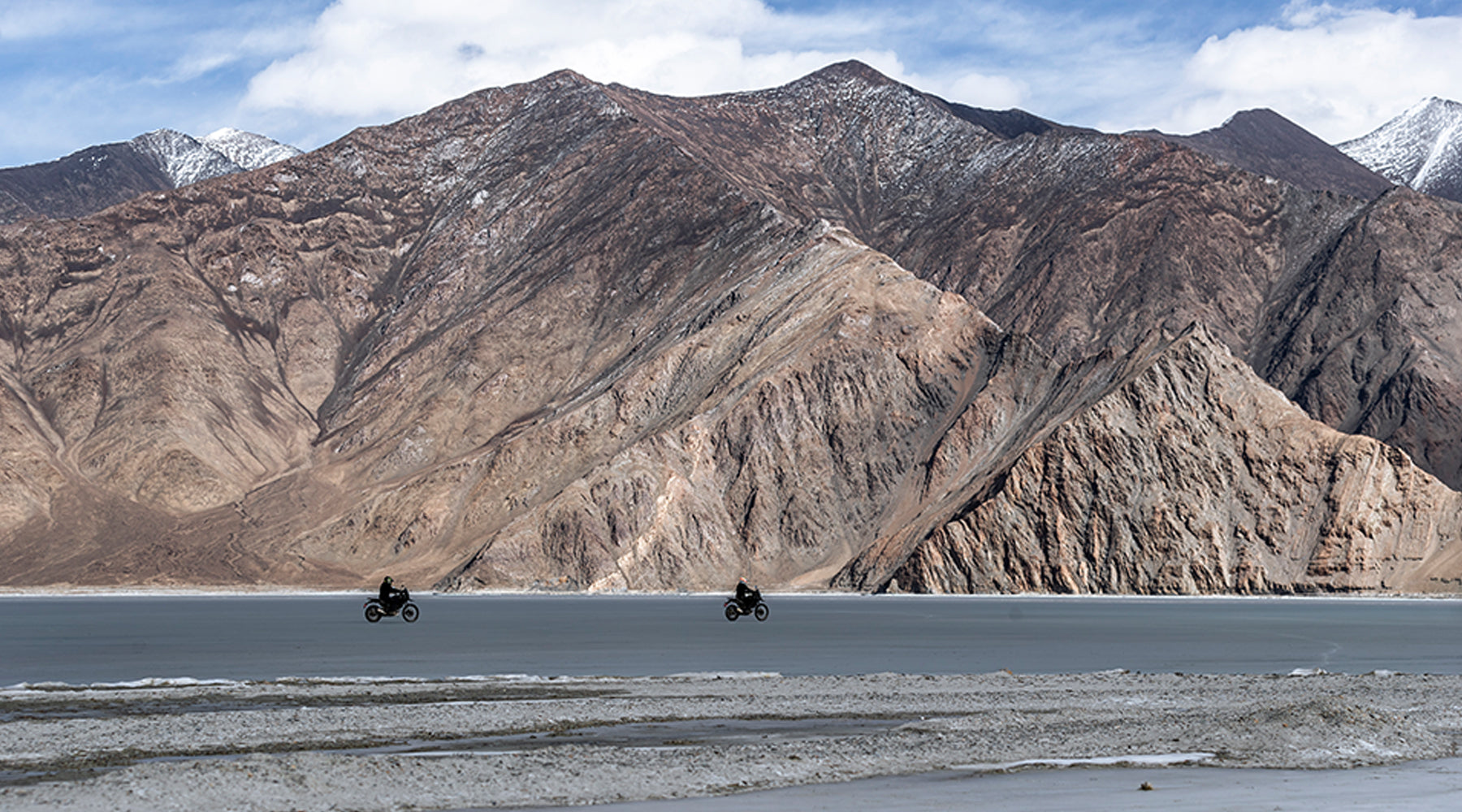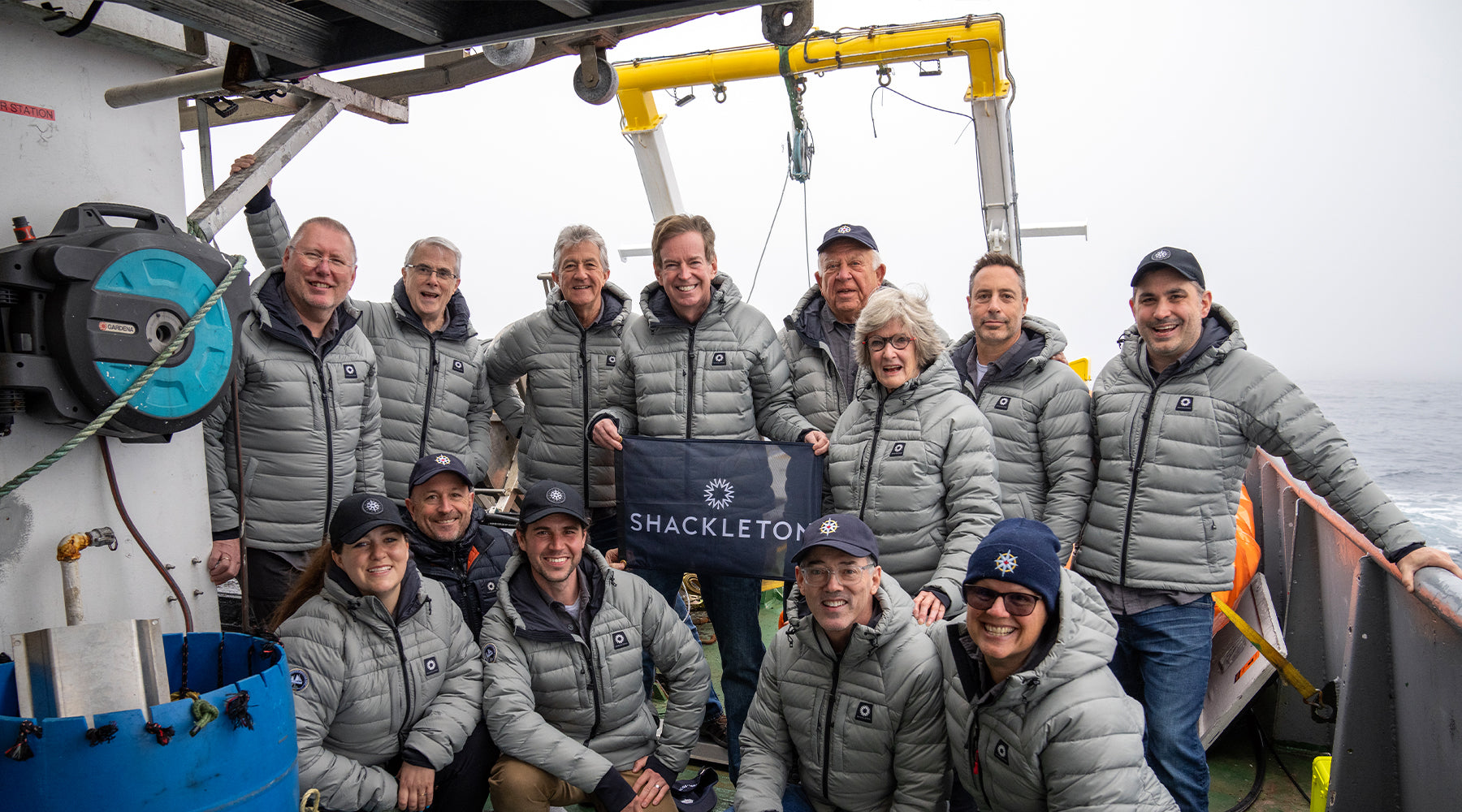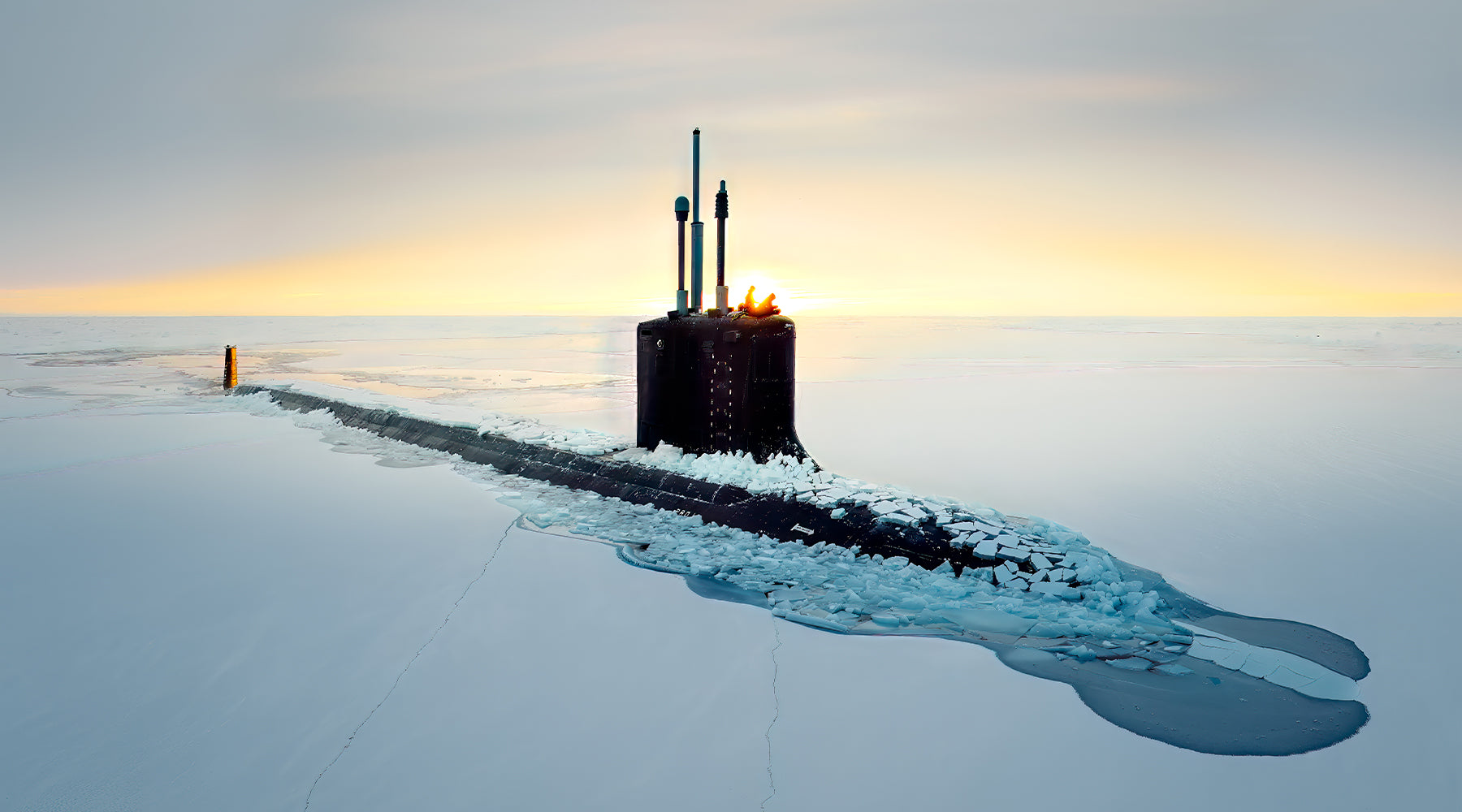
SHACKLETON X ROYAL ENFIELD HIMALAYAN // Louis Rudd's World-First Winter Traverse of the Himalayas
In February 2023, Director of Expeditions, Louis Rudd MBE pioneered a 1000 mile winter route across the Indian Himalayas on Royal Enfield’s all-new Himalayan 450 off-road motorcycle. The three week journey across the region’s most remote and spectacular mountain landscape reached altitudes of more than 5000m. Every day, Rudd and his team faced the relentless challenges of extreme cold, perilous terrain and the world’s toughest expedition conditions. Here's his expedition report.
We were deep in the Indian Himalayas, and we made a basic camp for the night in thin old Indian army tents, in temperatures of -20. We could hear the wolves howling in the darkness on the nearby ridge.
We’d ridden for several days, across ice, mountains, frozen lakes and rock-strewn roads. I was riding a Royal Enfield motorbike, and was being followed by a film crew. Despite my years of off-road biking, riding at altitude, and in such an isolated part of the world, was a new experience for me.

I’d first met Santhosh Vijay, from Royal Enfield, in Antarctica. The logistics base at Union Glacier is a melting pot of film-makers, scientists and expeditioners, and it can spark the most interesting ideas, plans and friendship. Santhosh told me that they had brought bikes to Antarctica with the aim of riding to the South Pole. I was immediately inspired by such a bold and ambitious plan, plus I recognised a like mind! We talked about doing some sort of motorbike trip in the future, and the plan gained momentum once we both returned home.
My first experience of Royal Enfield, and of India, was a trip to Goa for a bike festival called Ride Mania. It was a chance to see the bikes, but more importantly meet the rest of the team and develop our ideas. I’d ridden off-road around the world – the deserts of Oman, the mountains of Romania. But this plan was on another level.

The aim was to ride Royal Enfield’s latest bikes across the Ladakh region in the Himalayas, in winter. It had never been done before. There are only two main access roads into the area, and both are closed in winter due to the plummeting temperatures and deep snow. The small town of Leh, which would effectively serve as our base camp, stands at 3,500m. The only way in and out in winter is by air. I’d looked at photos of the area in winter and the ride looked like a tall order. I’d need all my biking and cold weather experience to pull this off.
The Expedition
We arrived in Leh, and found our hotel – one of the only ones open in winter, and found our bikes.
I was immediately affected by the altitude and spent the rest of the day recovering from the journey and acclimatising.
The next morning we met our team of film crew, mechanics and medics, plus their six vehicles. After being given the all-clear from the Doctor, who checked my oxygen levels and declared them good at 93%, we headed out for a test ride.
We rode for several hours out of Leh to a frozen section of the River Indus. This fast-flowing river rarely freezes, so we were lucky to find a fully-frozen section with a thin layering of snow on top. After fitting the bike with snow chains I ventured across. After making it safely to the other side and back, the team told me they were confident that it was the only successful crossing of the Indus ever completed on a motorbike.
It began to hit me just how cold this expedition was going to be. When you’re on a polar journey, you generate a lot of body heat pulling the sled. On a motorbike, you’re working to control the bike, but you’re basically wind-chilling yourself the entire time. At -10 plus wind chill, even with wearing every layer I had brought with me, it was hard to keep the hands and feet warm.

The following morning we departed for a 2-day leg of the expedition, covering a huge 175km. It was at that first campsite – a rudimentary camping area had been erected on the outskirts of a village – that the wolves took up an ominous howling for the night. It felt wild – in landscape, in flora and fauna. What with the wolves, the low temperatures, plus the vehicle support team turning the diesel engines over during the night to stop them freezing, I didn’t get much rest.
When we left the campsite the next day, the steep mountain track led to a helipad at the top, at around 4,500m. This was a really technical ride, followed by more riding for the film crew at the top. I rode a neighbouring ridge which they filmed with a drone.
I was still affected by the altitude, especially as we continued to climb, and I was getting breathless when picking up the bike. The descent was even more challenging, as all the weight was on the front wheel which kept slipping from beneath me. At the base of the track, we stopped to do some more filming at an old castle, which the locals reported to be haunted. No ghosts observed. After that was a long, cold ride back to Leh.
The highest point on the route was Khardungla, at over 5,400m. This was the plan for the next day, and we headed off into spin drift, more low temperatures, and icy roads. It was very hard to see the road, and at one point I came off on sheet ice, and bent the gear lever. We made it to the highest point, but didn’t hang around for long. The altitude was affecting us both – Santhosh to the extent that it was affecting his vision. It was time to go. The ride down to Hundar and a local hotel was incredible.
We were now on a long loop out, over the pass and eventually back to Leh. We spent a day riding in the sand dunes just outside Hundar. It was great fun, I did some stunts for the film crew had a whale of a time. After the sand riding, we visited the Hundar monastery with its giant Buddha statue. At over 106ft high, it was an impressive feat of engineering in such a high and remote location.

Finally, after snow, ice and boulder-strewn roads, we rode from Hunder to Durbok, and were treated to awesome gravel roads, which were perfect for a tour. It began to get colder still, and we fitted hand warmers onto the bike bars for the first time.
Meanwhile, the support vehicles containing the tents were not having such a great time. They weren’t able to get through, having set off later and finding the road closed. We had to shelter in a local village. Shelter might be overstating it a bit – the freezing rooms were so cold I slept in my down jacket, and in the morning, my water bottle had frozen solid. It was even colder than the tents the previous nights. It possibly would have been warmer outside.
After a simple breakfast of rice and bread supplied by the locals, we shot some more content before a 100km ride to Merak. This was another great mix of gravel and tracks, with some ice and snow. We reached Pangong Lake – an absolutely huge body of water, which was totally frozen. It is 134km long and 5km wide, with one third in India, and the rest in Chinese territory. At 4,225m, there was no surface snow, only sheet ice, and it was very tricky to ride on. We got some great footage though, and then rode on to Chushul and our camp site for the night.

Our final full day took in the Rezung La war memorial, where 114 Indian soldiers were killed in a battle with the Chinese in 1962. News of the incident didn’t reach the outside world for days, so remote and inaccessible is the area.

The going was much quicker after this, as the narrow track’s surface improved. We crossed a low pass before stopping for lunch. The cold riding on tarmac was back, before the final section of off road brought us to a camp by natural hot springs. The springs were on a beautiful open plain, surrounded by huge mountains on all sides. It seemed a fitting location for the final camp, and a wonderful way to end the expedition.
All that remained was another very cold 170km back to Leh. In total, we’d completed over 1,000km and around 12,000m of ascent.
A summer expedition to this area would make an incredible Shackleton Challenge – with breath-taking scenery, friendly locals and some challenging riding, we’ll definitely be back. Visit this page to sign up for priority access to the all new Himalayan Challenge in partnership with the Royal Enfield Himalayan.


